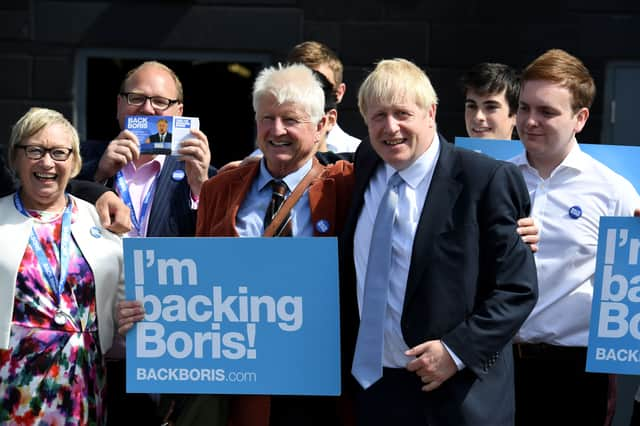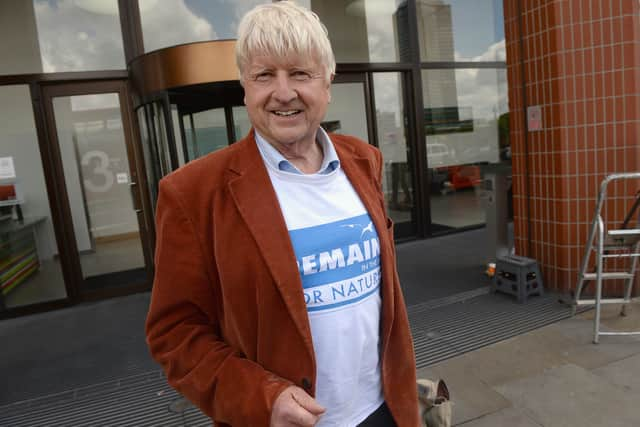Cronyism meaning: definition, what is it, nepotism vs cronyism – and why Boris Johnson has been accused of it
This article contains affiliate links. We may earn a small commission on items purchased through this article, but that does not affect our editorial judgement.


According to reports, Boris Johnson has nominated his father Stanley for a knighthood as part of his list of resignation honours. According to The Times, Stanley Johnson received the former prime minister’s nomination for the award.
Any honour for Stanley Johnson would raise questions for the former Conservative leader, who left office last September. The former prime minister was accused of cronyism after nominating his brother Jo Johnson for a peerage in 2020, and similar accusations will no doubt be made in light of the latest revelation.
Advertisement
Hide AdAdvertisement
Hide AdJohnson’s time in office was accompanied by an ongoing political row over cronyism. In April 2021, Downing Street announced an internal inquiry into the leak of private text messages between Boris Johnson and billionaire Sir James Dyson over the tax status of his employees.
Johnson promised the entrepreneur he would “fix” an issue after personal lobbying from Sir James as he sought to build ventilators at the height of the coronavirus crisis, in a series of text messages seen by the BBC.
But what exactly is “cronyism”? What does the term mean, where did it come from and how does it differ from nepotism? Here is everything you need to know.
What is cronyism?
Cronyism is the practice of awarding jobs and other advantages to friends or trusted colleagues, especially in politics. It includes appointing one’s "cronies" to positions of authority, regardless of their qualifications; cronyism is the opposite of meritocracy, in which appointments are made based on qualifications.
According to the Oxford English Dictionary, the word "crony" first appeared in 17th-century London, and is believed to be derived from the Greek word chronios, meaning "long term".
An alternative theory to the origin of the term comes from the Irish phrase “Comh-Roghna”, which translates as "close pals", or mutual friends.
Why is cronyism bad?
In politics, cronyism occurs when an appointer needs support for their proposals and chooses people who won’t try to undermine them by voting against them or holding opinions that differ from their own, regardless of their qualifications.
Although there is no precise definition of what constitutes "cronyism" in terms of appointments to public offices, government officials and public servants are particularly susceptible to accusations of cronyism because they handle and spend taxpayer funds.
Advertisement
Hide AdAdvertisement
Hide AdCronyism can be problematic because it can lead to unfair advantages for individuals who may not be the most qualified or capable, and can undermine the principles of fairness and meritocracy.
Despote this, accusations of cronyism can be incredibly difficult to prove, so it is common for politicians to form social, professional or political ties that result in the appointment of friends to positions of authority.


Why has Boris Johnson been accused of cronyism?
During Boris Johnson’s tenure as prime minister, political controversies over cronyism persisted. The former Conservative leader was accused of cronyism after nominating his brother Jo for a peerage in 2020, and in April 2021, leaked messages between Johnson and billionaire Sir James Dyson regarding the tax status of employees was the subject of an internal Downing Street investigation.
Johnson promised the entrepreneur he would “fix” an issue after he was directly lobbied by the entrepreneur as he sought to build ventilators early in the coronavirus crisis, when the Government was appealing to firms to supply ventilators amid fears the NHS could run out.
Sir James, whose firm is based in Singapore, wrote to the Treasury asking for an assurance that his staff would not have to pay additional tax if they came to the UK to work on the project. But when he failed to receive a reply, the BBC said he took up the matter directly with the Prime Minister, saying in a text that the firm was ready but that “sadly” it seemed no-one wanted them to proceed.
“I will fix it tomo! We need you. It looks fantastic,” Johnson replied, before texting him again saying: “[Chancellor] Rishi [Sunak] says it is fixed!! We need you here.” When Sir James then sought a further assurance, Johnson replied: “James, I am First Lord of the Treasury and you can take it that we are backing you to do what you need.”
Two weeks later, Sunak told the Commons Treasury Committee that the tax status of people who came to the UK to provide specific help during the pandemic would not be affected.
What is the difference between cronyism and nepotism?
Now, Johnson is likely to be the subject of yet more cronyism accusations after nominating his father Stanley for a knighthood as part of his list of resignation honours, a move that Labour leader Sir Keir Starmer has described as “outrageous”.
Advertisement
Hide AdAdvertisement
Hide AdHe told LBC Radio: “The idea of an ex-prime minister bestowing honours on his dad – for services to what? The idea that Boris Johnson is nominating his dad for a knighthood – you only need to say it to realise just how ridiculous it is.”
The former prime minister, who was forced out of Downing Street last September following a series of scandals, reportedly included his father as one of as many as 100 names put forward for honours. Technically in this instance, Johnson’s nomination of his father more closely resembles nepotism than it does cronyism.
Nepotism and cronyism are both forms of favoritism that involve giving preferential treatment to certain individuals, but nepotism refers to the practice of favoring relatives or family members. Both nepotism and cronyism can be problematic because they can lead to unfair advantages for individuals who may not be the most qualified or capable, and can undermine the principles of fairness and meritocracy.
In 2021, senior Tory MP Caroline Nokes and a journalist publicly accused Stanley Johnson, a former MEP, of touching them at Conservative party conferences. Nokes, chairwoman of the Commons Women and Equalities Committee, accused Johnson of forcefully smacking her on the backside and making a vulgar comment at the Conservative Party conference in 2003.